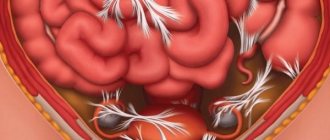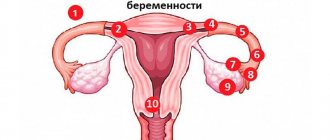Dear readers of my blog, hello. Today I want to look at a very interesting topic - fetal hiccups during pregnancy. The fact is that quite recently a close friend of mine encountered this phenomenon. She immediately began to panic and asked me to go to the doctor with her (her husband was on a business trip). A lot of interesting nuances came to light. It turns out that when a fetus hiccups in the womb, this is not always a cause for concern. I will try to tell you in as much detail as possible everything that I managed to learn from the doctor, so that you don’t worry.
Recognizing baby hiccups in the womb
The toddler begins to hiccup in the womb approximately in the middle of pregnancy. Sometimes this happens at the 24th week, sometimes at the 32nd. There is no clear time, the process is individual. Hiccups let mommy know that the baby has already developed both the respiratory and nervous systems.
How to recognize hiccups
- the fetus begins to twitch rhythmically in one place in the abdomen;
- a slight “ticking” is felt;
- pulsation is felt in the lower abdomen on both sides;
- twitching from the inside is accompanied by identical spasms;
- Identical tremors are felt for several minutes.
The duration of hiccups may also vary. For example, my friend noticed the signs listed above every few days for 2-3 minutes.
How often does a baby hiccup in the womb?
Pregnancy occurs in all women according to an individual scenario, and fetal hiccups also relate to the characteristics of the organisms of mother and child. The baby may hiccup every day or once a week; during pregnancy, these indicators may change, and some pregnant women do not feel fetal hiccups at all.
If hiccups occur too often (more than 3-4 times a day) and last more than half an hour, and are also combined with other warning factors, then you can tell your doctor about it. By comparing the facts about the course of pregnancy, the specialist will draw appropriate conclusions.
Causes of intrauterine hiccups in a child
Now let's move on to the main question - the reasons why a toddler may begin to hiccup in his mother's stomach. As the doctor explained to us, this condition is considered normal and the child does not experience any discomfort at all.
- The child’s nervous system has finished forming. Now he is trying to breathe and swallow on his own. Such breathing “gymnastics” will help him learn to suckle well at the breast after birth (some babies find this process difficult).
- When a baby swallows amniotic fluid, it immediately enters the lungs, resulting in hiccups. By the way, my friend really loves chocolate and all kinds of cakes. It was for this reason that her child swallowed sweet-tasting amniotic fluid.
- Lack of oxygen (hypoxia). In this situation, the child is trying with all his might to “get” oxygen for himself, so he actively moves in the womb and even hiccups.
If your child also hiccups, it is better to consult a doctor so that he can determine the cause of the phenomenon individually for you.
What to do
Hiccups in themselves are not a pathology or a sign of any disorder. But in some cases, the mother is able to correct her incorrect behavior thanks to such “signals.” To do this, it is necessary to compare the facts and try to understand the causes of the phenomenon. There may be several of them:
- The baby learns breathing movements - this is a kind of organ training. Mom doesn't need to worry.
- The baby swallows too much amniotic fluid during breathing movements. It is believed that if a mother eats a lot of sweets, then the baby may like the taste of the water. Then he takes large sips, the ventricle fills up and begins to put pressure on the diaphragm, which is the main cause of hiccups. An expectant mother should try to limit the amount of sweets in her diet
- The child is in an uncomfortable position. This phenomenon can occur in the later stages, when the space in the mother’s abdomen becomes less and less due to the active growth of the fetus. If a pregnant woman often sits in an awkward position, such as crossing her legs or hunching her back, the fetus's respiratory organs may become compressed, causing hiccups. Mom needs to move more and walk in the fresh air as often as possible.
- Emerging fetal hypoxia. But no need to panic!
Lack of oxygen to the fetus (hypoxia) cannot be expressed only in hiccups.
The consequence of emerging hypoxia is a whole complex of symptoms:
- increased activity of the baby;
- decreased heart rate (bradycardia);
- hiccups are too frequent and prolonged.
You should report these symptoms to the doctor who is caring for your pregnancy without panic. Having prescribed the appropriate tests, the specialist will identify or rule out hypoxia and decide on further actions.
You don’t need to do anything special to stop hiccups, but calm stroking, gentle conversation, and a lullaby can help the baby calm down faster. If hiccups prevent a pregnant woman from falling asleep, you can change your position.
Fetal hiccups in the mother's stomach are normal. The main thing a pregnant woman can do for her baby is to remain calm and give positive emotions. When a baby hiccups, you should not fear for the life and health of the fetus or be nervous about your own discomfort, because the mother’s negative emotions can cause much more harm than this phenomenon.
Hiccups caused by hypoxia
The symptoms of hypoxia are not difficult to determine; they are always the same.
- The baby begins to try to independently obtain the missing oxygen, the mother feels his increased activity, which was not previously noted.
- The child has a weak heartbeat.
- The duration of hiccups increases each time.
- Hiccups in the womb are observed too often.
Such sensations are a reason for the mother to be wary and visit her gynecologist. The doctor will prescribe tests that will help identify or rule out hypoxia. Only after all the checks will it be possible to say for sure whether the baby really does not have enough oxygen. The main thing for a pregnant woman is not to worry, as stress negatively affects the condition of the fetus.
What to do if your baby has hiccups
If the baby's hiccups cause discomfort to the mother and interfere with her daily activities, we can recommend the following:
- Do exercises. A few simple physical exercises will help improve blood circulation and saturate the body with oxygen.
- A light walk in the fresh air can have the same effect.
- If the baby hiccups when a woman is in a sitting or lying position for a long time, it is recommended to simply change the position more often.
- Since hiccups are often associated with eating sugary foods while pregnant, you can try reducing the amount of sweets in your diet. It is especially not recommended to eat sweets before bed.
- It may also be that the baby is simply cold. If the room temperature is low, you need to dress warmly or cover your stomach with a blanket. If you intend to walk in cold weather, you should also make sure that your stomach is warm.
- A few minutes in the knee-elbow position can help your baby calm down and stop hiccupping.
- For frequent attacks of hiccups, it is recommended to drink an oxygen cocktail.
- Simple breathing exercises can also help. It is performed like this: inhale for a count of 5, and exhale for a count of 10.
If a child suddenly begins to hiccup after some kind of stressful condition or shock to the mother, you need to calm down, sit down or lie down, and then stroke the belly for several minutes, turning to the child with love and tenderness. Even during pregnancy, babies are very sensitive, subtly perceive the mother’s emotional state and listen to it carefully.
What examinations does the expectant mother undergo if her fetus has hiccups?
In order to rule out hypoxia, the gynecologist prescribed my friend to undergo two examinations.
- CHT is a cardiotocogram. It allows you to observe the activity of the child, evaluate his heartbeat and uterine contractions of the pregnant woman. The procedure is most often prescribed for a period of at least 30 weeks. For the expectant mother and her child, CHT is not dangerous. The examination is absolutely painless. In addition, it will give you additional confidence that the child is developing according to the deadline.
- Ultrasound with Doppler. This ultrasound helps the doctor determine how well the baby’s heart is working in the womb and whether its blood vessels are sufficiently supplied with blood. Dopplerometry also provides information about the child’s oxygen supply. The study is safe and does not cause discomfort to either the mother or her fetus.
The body of a pregnant woman and her child in the womb are individual. One child eats too much, the other on the contrary - this can also cause hiccups. Hypoxia is extremely rare, so there is no need to worry ahead of time. Follow your doctor's recommendations and go through all the tests to make sure your child is developing normally.
How to get rid of hiccups in the fetus?
If a woman complains that frequent hiccups have been observed in the fetus for some time, and there are some signs of hypoxia described above, it is important to contact the gynecologist observing the pregnant woman in a timely manner and tell him about all the manifestations. As a rule, a specialist prescribes a cardiotocogram . This test can determine whether uterine contractions and fetal heartbeats are normal. CTG also allows you to find out if there are any deviations from the norm in the motor activity of the fetus. This procedure is performed after the 30th week of pregnancy; it is not dangerous or painful.
An informative study in this case is also an ultrasound with Doppler, with which you can determine the nature and characteristics of blood flow between the organisms of the mother, child and placenta. The doctor can find out whether the fetal heart is functioning normally and whether there are any abnormalities in the functioning of the placenta. Ultrasound with Doppler is similarly an absolutely safe and painless procedure. Carrying out these studies will allow us to exclude the presence of serious threats to the fetus or prescribe effective treatment in time to prevent problems in the future.
However, hiccups in the fetus are, first of all, an individual phenomenon, and every expectant mother should understand that there is no need to worry about its periodic appearance. According to medical statistics, in more than 90% of cases, doctors do not confirm fetal hypoxia. To avoid problems, it is important for a pregnant woman to eat rationally, get more rest, get adequate sleep and walk outside every day.
Methods to combat hypoxia
The expectant mother often needs to be in the fresh air - this is the simplest rule, following which you can prevent many complications during pregnancy.
With inhaled fresh air, oxygen constantly enters the placenta, which reduces the risk of developing hypoxia in the fetus. Not a single pharmaceutical oxygen cocktail can notice a woman and her unborn child walking in the park for several hours.
If the examination reveals hypoxia, under no circumstances should you treat it yourself. Only the doctor prescribes treatment based on the individual characteristics of the case. In mild forms of hypoxia, the following drugs are usually prescribed:
- Trental;
- oxygen cocktails;
- Chime;
- if the tone of the uterus is increased, no-spa or magnesium is additionally prescribed.
In case of severe hypoxia, which was noticed at the end of pregnancy, a caesarean section is required. If a baby is born with complications, he needs long-term medical care, and in acute stages - intensive care.
I repeat - this happens extremely rarely! I noticed from my friend that pregnant women are sometimes too suspicious. Do you need extra stress? Of course not, because the baby feels everything in the womb. For him, the main thing is his mother’s calm and confidence that everything will be fine.
how to tell if your baby is hiccupping in his stomach
And today we hiccuped for the first time, it was so cute - I didn’t even guess right away, and then I realized from the clear rhythm that my Treasure was hiccupping)))) So funny: I imagined how she was lying there, hiccupping and not understanding what was happening to her - My Sweetheart .I stroked my tummy, turned over to the other side and the hiccups went away.
In this regard, I started searching for information about how bad it is and why this happens.
“Many pregnant women do not understand what their baby is doing in their belly when they feel rhythmic kicks in the second or third trimester of pregnancy, and are then very surprised when they find out that the baby is moving this way because it is hiccupping. Exactly! Many babies hiccup in the womb several times a day. Logical questions arise: what causes hiccups, and why does a child hiccup in the stomach so often? No special research has been carried out in this area, however, scientists have certain assumptions. First of all, they believe that hiccups only occur if the fetus is sufficiently developed and its central nervous system has matured to the point where it can be controlled. The fetus inside the womb periodically swallows amniotic fluid, which can end up in the lungs. When this happens, the diaphragm begins to contract, resulting in hiccups. Intrauterine hiccups are absolutely safe for the baby and do not cause him harm. Moreover, it is believed that hiccups are some sign of health, or rather a healthy and developed nervous system. During pregnancy, almost all expectant mothers feel their children hiccupping in the womb. Some even experience entire periods of hiccups. Pregnant women should not worry about intrauterine hiccups, much less call a doctor, since they do not cause any discomfort to the fetus. According to some studies, hiccups, on the contrary, calm the baby and reduce pressure on the growing lungs and other organs. So, the next time you feel your baby hiccupping in your stomach, relax and rejoice that your baby is signaling to you that he is alive and well and there is no reason to worry. By the way, if your baby starts to hiccup during the next examination, you will be able to hear him hiccup when they listen to his heart rhythm. And don’t be surprised if the newborn also hiccups—babies don’t tend to change their habits even after they’re born!”
Useful tips for expectant mothers: what to do if your baby hiccups
Do not diagnose hypoxia in your baby ahead of time. This is unnecessary stress, which is strictly contraindicated for pregnant women. If your baby doesn't hiccup for too long and doesn't happen often, try following the tips below. They helped my friend, I think they will be very useful for you too.
- If the baby in the womb cannot calm down from hiccups, walk for 20-30 minutes in the fresh air.
- Check out a set of physical exercises for pregnant women that you can do at home. They will be very helpful.
- If the house is cold, it is possible that the baby is cold and therefore hiccups. Wrap your belly in a warm blanket and be sure to wear socks.
- Try not to eat too many sweets, especially before bed, so that the baby is not tempted to enjoy the “tasty” amniotic fluid.
- Breathing exercises are also beneficial for pregnant women and can prevent hiccups in the baby in the womb.
Now you know how to identify hiccups in your child and what to do in such a situation. I sincerely hope that I could be useful to you. By the way, as for my friend, her baby no longer hiccups, everything has gone away. She stopped eating chocolate bars and that was enough. She also now regularly does breathing exercises and simple exercises for pregnant women. He says that he feels much better and the little one has become calmer. I think it will be useful for you to follow her example.
Why do fetuses have hiccups?
Every expectant mother should clearly understand that both periodic manifestations of hiccups in a child and their complete absence are not a reason to worry about the development of the fetus. Hiccups in a baby during intrauterine development can occur due to internal and external causes. External causes include, for example, periodic ingestion of amniotic fluid in large quantities. This can happen when the baby is actively thumb sucking in the womb. As a result, active contractions of the diaphragm appear. Internal causes are manifestations hypoxia or individual symptoms of this phenomenon. Due to hypoxia, the child’s nerve center in the brain, which is responsible for the motor function of the diaphragm, is irritated. As a result, rhythmic contractions of the diaphragm occur.
If the causes of fetal hiccups during pregnancy are external, then the woman should not worry. Hiccups in this case indicate only the normal functioning and activity of the fetus. But if hiccups are a consequence of irritation of the motor nerve center of the diaphragm, then it is necessary to constantly monitor the development of the fetus. Hiccups caused by a lack of oxygen (hypoxia) are usually accompanied by some severe symptoms. The child in the womb behaves very actively, he has a decreased heartbeat, hiccups appear very often and do not go away for a long period of time. All these signs should be a reason to visit a doctor. Sometimes additional examinations and close monitoring may be required.










